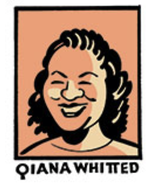|
Originally posted at The Hooded Utilitarian. Antebellum fugitive slaves were criminals according to the laws of their day. Their labor, their bodies, and any future that they might imagine belonged to the estates of the people who held the bill of sale. And so when enslaved black men and women wrote the stories of their escape in order to advocate for abolition, they took special care in persuading readers not only that the laws they had broken were unjust, but also that they had the moral strength to manage the freedom they had “stolen.” This is why when a Maryland slave named Josiah Henson, having been deceived by the master who vowed to manumit him, raised an axe above the head of his owner’s sleeping son, Henson stopped short of landing the fatal blow. In The Life of Josiah Henson, Formerly a Slave, Now an Inhabitant of Canada (1849), he explains: It was self-defence, — it was preventing others from murdering me, — it was justifiable, it was even praiseworthy. But now, all at once, the truth burst upon me that it was a crime. […] I was about to lose the fruit of all my efforts at self-improvement, the character I had acquired, and the peace of mind which had never deserted me. […] I shrunk back, laid down the axe, crept up on deck again, and thanked God, as I have done every day since, that I had not committed murder. (42-43) Scenes such as this constitute a fairly common trope in the slave narrative genre, one that literary critic Raymond Hedin described as the slave on the road. These moments, however accurately conveyed, were deployed in abolitionist narratives to refute the notion that without constant supervision, black people would succumb to so-called baser instincts that could turn “a pleasant-tempered fellow, into a savage, morose, dangerous slave” (Henson 41). Fugitive slaves responded by calling attention to the times in which they were out of the watchful eyes of their masters, or in a situation in which a white person was particularly vulnerable – in these instances, the enslaved would demonstrate their self-control and virtuous character by adhering to a higher standard of behavior. Henson, the man whom Harriet Beecher Stowe once tried to credit as one of the inspirations for Uncle Tom’s Cabin, presented himself as a man who held to an especially strict moral code. Nevertheless, it is unlikely that Henson would have been able to free himself or his family if he hadn’t eventually broken the law.
I thought about Josiah Henson when I watched the opening scene of Quentin Tarantino’s film, Django Unchained. The white bounty hunter, Dr. King Schultz, has forcibly purchased (rescued?) Django after a shoot out with the Speck brothers, the two slave traders transporting him. With one of the brothers killed and another trapped under his horse, Schultz turns to the small group of enslaved black men that had been chained to Django just minutes before and tosses them the keys to their leg irons: |
AboutAn archive of my online writing on comics, literature, and culture. (Illustration above by Seth!) Categories
All
Archives
July 2020
|

 RSS Feed
RSS Feed